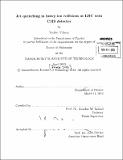Jet quenching in heavy-ion collisions at LHC with CMS detector
Author(s)
Yilmaz, Yetkin
DownloadFull printable version (19.39Mb)
Other Contributors
Massachusetts Institute of Technology. Department of Physics.
Advisor
Gunther M. Roland.
Terms of use
Metadata
Show full item recordAbstract
The collision of highly relativistic nuclei can produce a volume of high energy density which can be used to learn about the behavior of quantum chromodynamics (QCD) at extreme conditions, such as those of the universe at times before and during the formation of hadrons out of quarks and gluons. This thesis presents experimental studies of jet-quenching phenomena in PbPb collisions at [square root of]sNN = 2.76 TeV, with a focus on the study of the energy-loss, namely the analysis of correlations of jet pairs as measured by the CMS detector at LHC. The implications of the results are discussed by comparison of simple models with data. It is observed that the geometrical configuration of the dijets and the nuclear collision region plays an important role in the correlations between the jets, and the set of CMS results reviewed can illustrate the dependence of the amount of lost energy on the length of the traversed medium.
Description
Thesis (Ph. D.)--Massachusetts Institute of Technology, Dept. of Physics, 2013. Cataloged from PDF version of thesis. Includes bibliographical references (pages 143-148).
Date issued
2013Department
Massachusetts Institute of Technology. Department of PhysicsPublisher
Massachusetts Institute of Technology
Keywords
Physics.